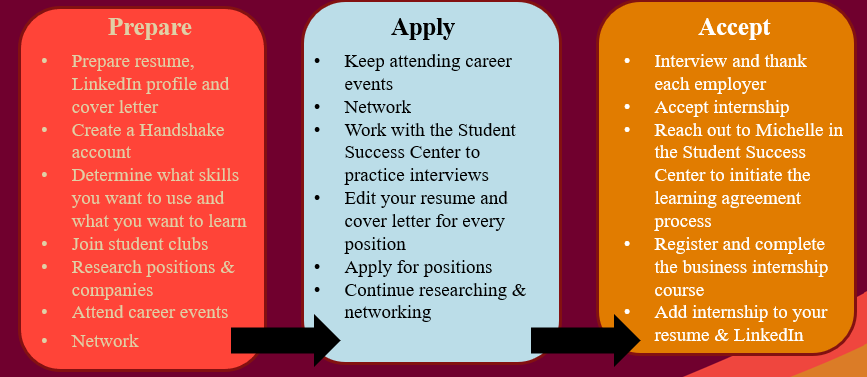Internships
What you do in the classroom is only one element employers consider. It is important to take a holistic view of your education. Having completed at least one internship and participating in clubs or professional organizations will help you be a more well-rounded graduate and job applicant.


What is an Internship?
-
A structured learning experience (specific timeline)
-
Provides opportunities to apply classroom knowledge in a “real world” professional environment
-
Encourages you to develop and refine skills that are transferable to a variety of work settings
-
Includes a position description with relevant and clearly defined learning objectives that align with your major or career path
-
Provides mentorship from a professional
-
Includes resources, equipment and facilities that support learning goals
-
Should be paid
More About Internships
- Gain Important Experience: Internships provide real-world exposure that complements classroom learning.
- Get Your Foot in the Door: Many companies use interns as their primary recruiting pool for hiring.
- Grow Your Professional Network: During internships, you interact with professionals beyond the classroom setting.
- Improve Your Academic Performance: Participating in internships has been linked to higher GPAs, better graduation rates and the potential to graduate on time or even early.
- Develop Key Skills: Internships allow you to hone essential soft skills such as communication, problem-solving, teamwork and adaptability
- Learn More About Yourself and the Field: Internships provide insights into your own interests, strengths and areas for growth. They help you clarify your career goals and make informed decisions about your future path.
- It’s never too early to start planning for your internship.
- Planning well in advance will maximize on the opportunities available to you.
- Some internship opportunities and businesses may move quickly, so it is advised to get prepared early.
- Below is a general timeline to assist you with the planning process.

- The College of Business allows students to achieve up to 6 credits at the undergraduate level and 6 credits at the graduate level for internships.
- Students achieve credit by enrolling in a 3-credit asynchronous course and completing career development coursework while in their internship.
- Internships must meet these requirement in order to qualify:
- Students must work for 150 hours to qualify for 3 credits
- The internship must align with the student’s major
- The intern should have a dedicated mentor in addition to their supervisor (Depending on the size of the organization, the mentor can also be their supervisor as long as there is dedicated time to help the intern with their personal and professional growth.)
- An internship should be paid unless it meets strict guidelines.
- Once you have secured an internship, reach out to Michelle Schwartz for help initiating the next steps in the process.
Gianchetta Student Success Center on the lower level of the Gallagher Business Building
- The office is a great repository of resource documents to help you get started:
- Resume templates
- Resume Tips and Tricks
- LinkedIn Advice
- Student Success Center Team
-
To get feedback on your resume, LinkedIn profile and cover letter:
- Griz Career Network: The Griz Career Network (GCN) is an easy and incredibly powerful way to strengthen the University of Montana community. Whether you are interested in mentoring or sharpening your skill-sets, the network provides resources, trainings and connections to help ignite your career journey.
- LinkedIn Learning: Learn how to manage your career, from your first job search to moving up in your career to switching careers. Get the skills you need to grow your network, write a resume, interview, get a job, and get promoted. (Please note: LinkedIn offers a free month trial for LinkedIn Learning)
- IRIS Photo Booth: Get a free professional headshot for your LinkedIn profile in ELCS
Reach Out to Learn More
Michelle Schwartz
Director of GSSC and Internships
t: (406) 243-6771
e: michelle.schwartz@umontana.edu
Students, please use this link to schedule an appointment with Michelle.
